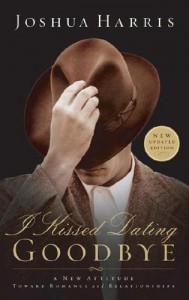Like probably most of you, I read Josh Harris’ “I Kissed Dating Goodbye” as a rite of passage when I entered my teenage years. Harris, a single young adult at the time his book was published, became a bestseller because what he pointed out–that the modern dating scene had become “a training ground for divorce”–was unarguably true.
Kids in the 1990s (and today) pursue exclusive romantic relationships with the opposite sex from the time they’re in middle school and easily have a dozen “boyfriends” or “girlfriends” under their belts by the time they enter college. In Harris’ mind, this kind of recreational dating was a disaster for Christians trying to teach their children the virtue of chastity applied through biblical rules about sex. I can’t recall whether Harris used the analogy or not, but my own parents did. Dating when you’re not prepared for marriage, they said, was like walking into a grocery store without money. You will either leave hungry, or take something that isn’t yours.
 “I Kissed Dating Goodbye” challenged Christians to reassess this cultural norm of recreational dating, and proposed a more intentional alternative, which Harris dubbed “courtship.” This, he argued, would make it easier for Christian families to invest the teenage years wisely and avoid sexual temptation.
“I Kissed Dating Goodbye” challenged Christians to reassess this cultural norm of recreational dating, and proposed a more intentional alternative, which Harris dubbed “courtship.” This, he argued, would make it easier for Christian families to invest the teenage years wisely and avoid sexual temptation.
I didn’t follow Harris’ proposal to the letter. Ultimately, I dated before marrying my wife. But I did take to heart what I thought was the kernel of his work: intentionally seeking a spouse, rather than using romance as a kind of pastime. I also made certain both families were involved, especially fathers. I appreciated his challenge for what it was, and moved on with my life.
But it seems many haven’t moved on. A whole subculture of people evidently feel wounded and betrayed by “I Kissed Dating Goodbye,” and Josh Harris, now 41, has spent so long getting an earful about it that he’s set up a website to receive all the complaints and recriminations about his book. In a spectacularly histrionic piece in Slate, we find one such message submitted on Harris’ site:
“I have been married to my wife for over seven years. We’ve been together over ten. We have a beautiful daughter, and successful careers. When we were dating, we had sex. Because of the shameful purity movement rhetoric we learned from your book, sex became tainted. To this day, I cannot be intimate with my wife without feeling like I’m doing something wrong. Sinful. Impure. We both adored your book as young people. And I believe our diligent commitment to your ideas, and our “failing to stay pure until marriage” has permanently damaged our relationship. Years of truth and counseling later, I cannot get the subconscious idea out of my head that I am doing something wrong. Damn you.”
Admittedly, this one is over-the-top. And as Samuel James helpfully points out, the progressives at Slate see the backlash against Harris as a chance to wage a proxy war against Christian sexual morality. They don’t just want to repudiate “purity culture” (as many Christians who hate Harris but still hold the traditional no-sex-outside-of-marriage ethic do). They’re itching to hitch all of Christian teaching to “I Kissed Dating Goodbye” so they can dismiss the whole package as repressive and damaging. I call this tactic “Westboroing” (an allusion to the liberal media’s obsession with the tiny, homophobic Kansas Baptist church as a representation of evangelical Christianity writ large).
But Harris has no shortage of Christian critics, many of whom grew up reading and living by his book. They’ve nebulously branded “I Kissed Dating Goodbye,” “True Love Waits,” “promise rings,” and other accouterments of the Christian 90s as “purity culture,” and they want to heap it all into a pile and set it on fire.
As the author of “purity culture’s” most recognizable artifact, Harris has become a kind of scapegoat for any complaint against the movement, including more extreme wings like Bill Gothard’s Advanced Training Institute (the denim skirt folks). But twenty years after “I Kissed Dating Goodbye” was published, many of the accusations former fans are hurling at Harris are bizarre, and don’t resemble anything he ever said or wrote.
Slate summarizes:
“I Kissed Dating Goodbye wasn’t just a book people read; it was a book they obeyed. It prompted some people to marry the first person they dated, even if they were unhappy together; to view the opposite sex with fear and suspicion; or to be afraid of starting any relationships at all. Others have struggled with viewing sexual abuse as evidence they were tainted. As one recent response on Harris’ site put it, “I feel the only man I deserve is one who is broken like me.””
A more recent entry came from Relevant, where Jonathan Trotter lists three so-called lies “modesty culture” teaches men about women:
The first lie? “Women are scary.”
In modesty culture, men are taught to be “terrified” of women, and as a result, have trouble interacting “with half of the human population.” Modesty, Trotter explains, teaches men to “look at the dirt when a woman walks by instead of looking her in the eye,” and the two sexes never “develop healthy relationships.”
Lie number two, he writes, is that “men have a responsibility not to look (but women have more responsibility not to be looked at.)”
He says evangelical leaders in his formative years talked a lot more about the female responsibility to cover up than they did about the male responsibility not to entertain lust. This amounted to “shifting the blame,” he argues, and is “just really stupid” and “offensive, because it’s basically saying that guys can’t help themselves,” so “Please, ladies, put this blanket on.”
Lie number two (yes, he lists two twice) is that modesty culture “dehumanizes women” by “reducing their complexity and unique personhood to their sexuality.” This kind of thinking, he expounds, “causes us to judge people who don’t live according to our–sometimes arbitrary–standards, and says that clothes determine who we can hang out with.”
And Jesus, he helpfully reminds us, hung out with sinners.
Let me take a deep breath at this point and transition to my main observation: Neither Josh Harris, nor any other popular writer I am aware of who could reasonably be called a member of “purity culture” ever said or taught any of these things. And since neither Slate nor Relevant saw fit to cite any examples or page numbers, it’s difficult to say precisely what they’re referring to.
But this kind of evangelical victim lit is all-too-familiar. It’s become a flourishing online genre, particularly in the more progressive corners of the blogosphere. And it thrives on the type of vague, accusatory, often whiny generalizations I’ve just explored, typically directed in shotgun fashion at “purity culture,” or the homeschooling movement. After several lengthy and heated exchanges on Facebook, I’ve noticed a few recurring themes (“cliches” one might say) that characterize the evangelical version of the grievance olympics:












